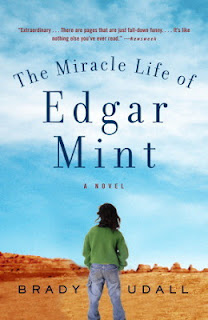I'd been looking forward to reading The Little Book for my book group this month, and in the beginning I was sure I would love it--time travel fascinates me. But love it I did not. I would give it a solid three stars, but I felt bogged down by some of the plot. It took me a few weeks to finish it.
Edwards took 30 years to finish this book, and in some ways it felt like he was overambitious. He tackles fin de siecle Vienna, the life of Sigmund Freud and Gustav Mahler, World War II, Mark Twain, and Adolf Hitler...oh, and baseball and rock music and supposedly the beginning of the feminist movement, too.
Wheeler Burden is the protagonist--a character so perfect (star baseball player and brilliant rock musician) that he reminds me of Peekay in that dratted book The Power of One (although I liked this book better than that one). His father was perfect too, and even a war hero worshipped in several different countries. The book starts when Wheeler is 47 in 1988, and he goes back to fin de siecle Vienna in the year 1897, where he falls in love with his grandmother and befriends his now-dead father. (Yes, he was in love with his grandmother...is that weird and creepy or what??? Who cares if he's not technically related by blood? Still creepy.)
I enjoyed the descriptions of Vienna during the turn of the century, and many of the characters were colorful and interesting (I would have liked to have seen more of Wheeler's mother, though). I learned more about the formation of Sigmund Freud's ideas and the rise of fascism in Europe...and I find it intriguing to consider: what would I do if I could change the course of the world by pre-empting an evil dictator's rise to power?
But the book also had some serious flaws. Enough of the baseball...boring, and I couldn't really see how it was important for the story. The ramblings about "the Venerable Haze" and the "Little Book" got tiresome too. What was so brilliant about the "Little Book"? It was entirely unclear to me. As Ron Charles writes in his review in The Washington Post, "We never hear anything from this book ourselves, but we're told again and again how great it is."
Charles sums up my thoughts:
"In fact, Edwards makes so many hyperbolic claims that The Little Book begins to sound rather flat, like a tall tale told without a wink. Edwards can't stop petting Wheeler and reminding us how wonderful he is. Of course, he's incredibly good looking and sexually athletic, but he also writes a foundational work of 20th-century philosophy and inspires "the beginning of the American feminist movement." (You didn't think women could do that on their own, did you?) And he throws the fastest pitch in college baseball (at Harvard, naturally). Then he writes "the most famous song of the 1970s" and becomes "one of People magazine's Most Recognizable." Then he publishes a bestselling book in the 1980s. The whole narrative is soggy with hero-worship, like the fantasy of a skinny teenage boy staring into a mirror."What finally makes my head hurt in this whole time travel adventure is that we never really learn how they are able to time travel. Is it hereditary? Or perhaps sort of afterlife experience? And supposedly they are in an endless loop, ever meeting again...so the world will never end? I just can't get my head around it. I wanted some sort of resolution to how this weird time travel thing happened, but I never got one.
This book was wildly inventive and wacky, and I give kudos to Selden Edwards for dreaming it up. Perhaps if he had worked on the book for fewer years and not tried to make it so full of meticulous research, I would have found it less frustrating. And what the heck would they do with a wooden frisbee? Find fame and fortune? The characters were just too damn perfect for my liking (except for that incest grandmother-grandson thing...which I still find incredibly odd that the author thought this was romantic), while at the same time I didn't feel that sympathetic or connected to Wheeler. I liked his mother better.






















